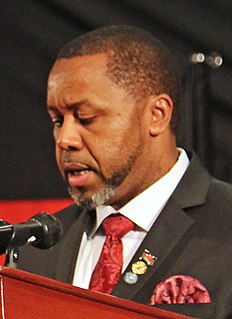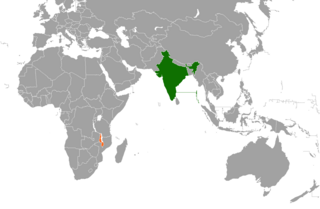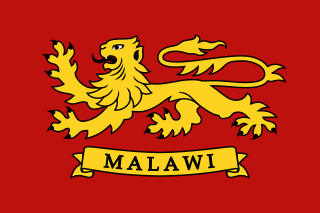
Politics of Malawi takes place in a framework of a presidential representative democratic republic, whereby the President of Malawi is both head of state and head of government, and of a multi-party system. Executive power is exercised by the government. Legislative power is vested in both the government and the National Assembly. There is a cabinet of Malawi that is appointed by the President of Malawi. The judiciary is independent of the executive and the legislature. The government of Malawi has been a multi-party democracy since 1994. The Economist Intelligence Unit has rated Malawi as "hybrid regime" in 2016.

The economy of Malawi is predominantly agricultural, with about 80% of the population living in rural areas. The landlocked country in south central Africa ranks among the world's least developed countries. In 2017, agriculture accounted for about one-third of GDP and about 80% of export revenue. The economy depends on substantial inflows of economic assistance from the IMF, the World Bank, and individual donor nations. The government faces strong challenges: to spur exports, to improve educational and health facilities, to face up to environmental problems of deforestation and erosion, and to deal with the problem of HIV/AIDS in Africa.

Malawi's former President Bakili Muluzi continued the pro-Western foreign policy established by former President Hastings Banda. It maintains excellent diplomatic relations with principal Western countries. Malawi's close relations with South Africa throughout the apartheid era strained its relations with other African nations. Following the collapse of apartheid in 1994, Malawi developed, and currently maintains, strong diplomatic relations with all African countries.

Lilongwe is the capital and most populated city of the African state of Malawi. It has a population of 989,318 as of the 2018 Census, up from a population of 674,448 in 2008. The city is located in the central region of Malawi, in the district of the same name, near the borders with Mozambique and Zambia, and it is an important economic and transportation hub for central Malawi. It is named after the Lilongwe River.

Lake Malawi, also known as Lake Nyasa in Tanzania and Lago Niassa in Mozambique, is an African Great Lake and the southernmost lake in the East African Rift system, located between Malawi, Mozambique and Tanzania.

Bingu wa Mutharika ) was a Malawian politician and economist who was President of Malawi from May 2004 until his death in April 2012. He was also President of the Democratic Progressive Party, which he founded in February 2005; it obtained a majority in Malawi's parliament in the 2009 general election. During his two terms in office, he was noted for being the Chairperson of the African Union in 2010–2011, as well as for several domestic controversies. In 2009, he purchased a private presidential jet for $13.26 million. This was followed almost immediately by a nationwide fuel shortage which was officially blamed on logistical problems, but was more likely due to the hard currency shortage caused by the freezing of aid by the international community He died of cardiac arrest in Lilongwe while in office on 5 April 2012, at age 78.

The Malawi national football team, nicknamed The Flames, is the national team of Malawi, a country in South Eastern Africa, and is controlled by the Football Association of Malawi. Before 1966, they were known as the Nyasaland national football team.

The University of Malawi (UNIMA) is an educational institution established in 1965 and composed of five constituent colleges located in Zomba, Blantyre, and Lilongwe. Of the five colleges, the largest is Chancellor College in Zomba. It is part of the Malawian government educational system. The present Vice Chancellor is Professor John Kalenga Saka. UNIMA celebrated its golden jubilee from the 24 to the 26 September 2015.

Joyce Hilda Banda is a Malawian politician who was the President of Malawi from 7 April 2012 to 31 May 2014. She is the founder and leader of the People's Party, created in 2011. An educator and grassroots women's rights activist, she was Minister of Foreign Affairs from 2006 to 2009 and Vice-President of Malawi from May 2009 to April 2012.
Malawi Lomwe, known as Elhomwe, is a dialect of the Lomwe language spoken in southeastern Malawi.
Education in Malawi stresses academic preparation leading to access to secondary school and universities. However, few students go on to high school or university. The dropout rate is also very high particularly among primary school pupils.

Malawi was a predecessor to the modern-day Republic of Malawi. It existed between 1964 and 1966. When British rule ended in 1964, by the Malawi Independence Act 1964, the Nyasaland Protectorate, formerly a constituent of the Federation of Rhodesia and Nyasaland, became an independent sovereign state. The British monarch was head of state and Malawi shared the sovereign, Queen Elizabeth II, with the other Commonwealth realms. The monarch's constitutional roles were mostly delegated to the Governor-General of Malawi, Sir Glyn Smallwood Jones.

The Malawian Defence Force is the state military organisation responsible for defending Malawi. It originated from British colonial units formed before independence in 1964.

Saulos Klaus Chilima is a Malawian economist and politician. Before joining politics, Chilima held key leadership positions in various multi-national companies including Unilever, Coca-Cola and Airtel Malawi, where he rose to become Chief Executive Officer.

India–Malawi relations refers to the international relations that exist between India and Malawi.














